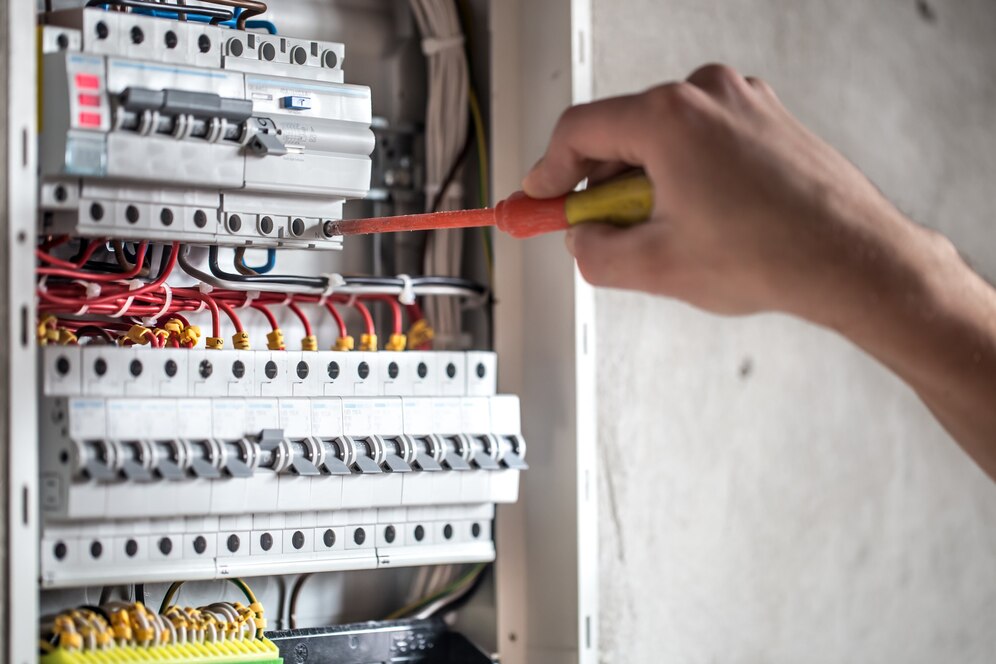Electrical safety is a crucial aspect of maintaining a secure and functional home. However, the difference between a circuit breaker and a fuse box can be unclear for many homeowners. Both of these electrical components act as predominate safety devices designed to protect your home’s electrical system from damage caused by overcurrents or short circuits. We are here to help you understand the key differences between these two electrical protection options and determine which is suitable for your property.
Fix It 24/7 will explore the primary distinctions, advantages, and disadvantages of circuit breakers and fuse boxes, equipping you with valuable knowledge to make informed decisions about your home’s electrical infrastructure. Being well-informed about your home’s electrical protection system is the first step toward ensuring optimal safety and reliability.
1. A Brief Overview: Circuit Breakers and Fuse Boxes
Fundamentally, both circuit breakers and fuse boxes serve similar purposes – they protect your home’s electrical system and appliances from excessive currents or electrical faults that could lead to fires or damage. While the underlying goal is the same, these two devices operate using different methods and technologies, which have their own distinct advantages and disadvantages. We’ll explore these differences and guide you through the process of determining which option best suits your home’s needs.
2. How Circuit Breakers Work
Circuit breakers are standard in modern homes, offering an automatic, reusable safety mechanism that interrupts electrical flow when a fault is detected. Comprised of an electromagnet, a bimetallic strip, and a switch, a circuit breaker can ‘trip,’ or open the circuit path, when it senses an overload or short circuit, preventing damage to wiring or appliances. When tripped, the switch changes position, disconnecting the flow of electricity through the circuit. To restore power, a homeowner simply needs to find the corresponding switch on the breaker panel and reset it manually.
Advantages of Circuit Breakers:
- Reusable: Circuit breakers don’t require replacements after being tripped.
- Convenient: Easy, quick restoration of power by resetting the switch.
- Safer: The switch mechanism can reduce the risk of electrical fires or damage to electrical systems.
- Customizable: Some feature adjustable settings for current sensitivity, allowing for better sensitive electronics protection.
Disadvantages of Circuit Breakers:
- More expensive upfront: Installation and equipment cost can be higher compared to fuses.
- Slightly slower response: May take slightly longer to respond to electrical surges than fuses.
3. How Fuse Boxes Work
In contrast to circuit breakers, fuse boxes rely on mechanical components called fuses to protect your home’s electrical circuits. A fuse contains a thin metal wire that’s designed to melt when exposed to excessive current, breaking the circuit and stopping the flow of electricity. If a fuse burns out, it needs to be replaced by a new one. Fuse boxes were once the primary electrical protection method, but they are less common in modern homes due to their less convenient and less flexible nature compared to circuit breakers.
Advantages of Fuse Boxes:
- Less costly upfront: Fuse boxes often have lower installation and initial equipment costs.
- Faster response: Fuses can respond to overcurrents slightly faster than circuit breakers.
Disadvantages of Fuse Boxes:
- Require replacement: Fuses must be replaced after burning out, and finding the correct size and type for each circuit is essential.
- Inconvenient: Replacing fuses can be more time-consuming and burdensome than resetting a breaker.
- Limited customization: Fuses have less adaptability for specific current sensitivity.
4. The Importance of Professional Installation and Maintenance
Regardless of whether your home has a circuit breaker or fuse box, professional installation and maintenance is essential for the safety and reliability of your electrical system. Our technicians understand the nuances of both systems, ensuring that the chosen setup is correctly installed, maintained, and modified as required. Furthermore, we can help identify potential risks unique to your home and offer solutions that further enhance electrical safety.
5. Which is Right for Your Home?
Choosing between a circuit breaker and a fuse box comes down to personal preference, budget, and your home’s electrical system needs. Circuit breakers are favored for their ease of use, convenience, and adaptability, but they may come with a higher initial price tag. On the other hand, fuse boxes can be less expensive upfront and offer slightly faster response times; however, they require more frequent maintenance through fuse replacement.
Homeowners with older properties may find that upgrading from a fuse box to a circuit breaker system is worth considering, as the benefits of circuit breakers often outweigh their initial costs in the long run. Additionally, many insurance providers prefer circuit breakers due to their enhanced safety features, which can impact coverage and premiums.
To make the best decision for your home, consult with our professionals, who can assess your property’s electrical system and offer personalized recommendations that balance safety, efficiency, and cost-effectiveness.
Conclusion: Trust Our Experts to Help Choose the Right Electrical Protection for Your Home
Ultimately, choosing the right electrical protection solution for your home is a matter of understanding the differences between circuit breakers and fuse boxes and selecting the option that best aligns with your specific needs, budget, and preferences. With the guidance of our experienced professionals at Fix It 24/7, you can feel confident that you’re making a well-informed decision, ensuring the safety and reliability of your electrical system.
Don’t leave your home’s electrical safety to chance. Let us help you navigate the world of circuit breakers and fuse boxes, and ensure your home is safeguarded against overcurrents and short circuits. Contact our electrician in Brighton today to schedule an appointment with our knowledgeable technicians, who are committed to providing expert advice and reliable service tailored to your unique needs.

